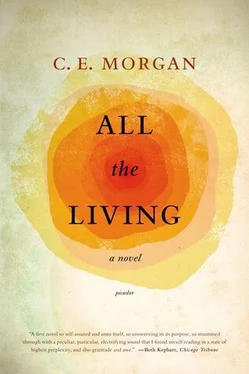I’m fixing to get some men for today, Orren said.
Where at? she said, casting out over the gold-green tobacco, the darkened soil.
Hansonville. On the road. They come for the pullings.
He turned and looked down toward the tawnied field and she eyed his back. She had half a mind to offer her hands to him for the day, but instead she tapped her teeth pensively behind him. She wanted something from him first. It was true she didn’t know the first thing about cutting tobacco, she’d already proved herself more liability than help, but still it was the asking that she was waiting for. She grasped the weak power of waiting for him to come to her.
When Orren left for town, Aloma decided that, despite the heat, she would bake for most of the day in order to pass the time until she went to the church. She set up fans in the kitchen windows that drew the hot air out and read her scores line by line as though they were books while the breads rose and browned. But her spirit was aimless, she stood repeatedly all day, walking to the back door to gaze down to the field where Orren and the men stooped and cut the yellowed butt and middle leaves, piercing the stalks on the sticks so the field was lined with rows of miniature husked tepees. Stray leaves scattered on the soil between the rows, one of the men returned and collected them, dusting them with his gloved hands. At the southern edge of the field the curing shed stood in wait, its wide black doors rolled open. In the early afternoon, when the heat of the baking punished the room, Aloma walked out of the house and stood shielded from sight by the withes of the willow and she watched them work. Orren stood and pointed, they conversed in a distant silent circle. She wondered then if Bell was cutting his own harvest this week. It seemed likely, the butts of his tobacco were already broad and browned when she had visited. She would have to ask him. Aloma lingered a moment more under the willow, looked back once over her shoulder as she retreated to the house with her hands in her pockets. She had only wanted him to ask.
By three she had already haunted every room a half dozen times so she abandoned her baking and drove to the church and she let herself in. The building was quiet, empty. Her playing echoed in the room and she waited impatiently for Bell to come, but when he did, he entered through the back and went straight to his office without stopping. She listened to the single clapping sound his door made when it closed. Aloma waited for a minute or two to see if he would appear in the doorway, but when he did not, she tried again to focus on the keyboard, but her will was sapped and she could not sit still. She wanted to go back to Bell’s office and speak to him — about what she didn’t care, about anything really — but she didn’t. She just forced her fingers to the keys until she felt that the music jammed like a machine whose gears had caught and she had to stop herself from bringing her hands down on the keyboard in frustration. She was gripped by a surging restlessness. Her ears strained for any sounds from Bell’s office. Then finally she shot up from the piano, angry at Bell’s silence, or perhaps at Orren, and she grabbed her scores and drove home.
Behind the big house, the men were still in the fields, tents of tobacco windrowed where the flush yellow plants had been, the stalks cut and wilting on sticks in the sun. The men were bent in their cutting and sticking so that Aloma could not distinguish between them. She could not even determine which one was Orren until he straightened up and removed his cap to wipe the sweat from above his eyes. Then he returned the cap to his head and turned away again into the anonymous gesture of his labor.
Aloma was hot and silent as the kitchen she stood in. She made roast beef sandwiches without singing to herself or otherwise uttering a sound. There was no point in wiping away the sweat from her lip or from her chest where it ran in the thinnest stream between her breasts. As she carried a platter of sandwiches and a pitcher of stirred lemonade down to the field, Orren and one of the hands made their way to the curing barn, their unbuttoned shirts trailing from the waistbands of their trousers so Aloma could see the sun-marked working of their backs. The third man, fanning himself with a stray tobacco leaf, stood and watched them go. He buttoned up his shirt, unhurried, when he saw Aloma coming down the row, her skirt whispering against her legs as she came, the pitcher chittering on the tray.
Ma’am.
She nodded at him, took in the sunbeat face and freckled lips, his cigarette-drawn mouth. When he turned his fair colorless head, she saw through his various missing teeth to the dark interior of his mouth.
He took one sandwich, said, You his girl?
Aloma looked to the curing barn, took her time. Yeah.
Well, he ain’t much to look at, but he’s hell for stout.
Aloma laughed, she couldn’t help it.
It’s a tough job for that boy, the man said.
To harvest, she said.
The whole bit. He made a gesture with one finger lifted off the bread of his sandwich, to indicate the whole of the farm.
Aloma looked around, her brows knitted together. Yeah, the whole bit, she conceded. Her eyes found Orren inside the barn fiddling with a yardrod peering into the rafters, and when he reached up with his arms spread so his body opened up momentarily like something blooming, she was afflicted with the memory of how he had been when she first met him as he stood with his cap on, looking at her sideways like he knew he was going to have her before he even did, just because he still believed good things could happen. Her mouth slid open.
The man stood watching her face, the tobacco leaf idle in his hand. Tough job for a girl too. Just a mite little thing. It a wear the living out of you.
Her eyes refocused on his. No, I’m mean enough for it.
He laughed a phlegmy smoker’s laugh. Most girls is mean, he said. Right to hear one say it, though. Then he said, He told us his people died. That’s a mess. He looked around them at the cut plants. Got to be done, I reckon.
It’s got to be done, she parroted flatly, looking down at the bowing severed plants, but even as she said it, she thought, But why?
The man only nodded his head, Well, sure, sure. He done good. He’s a good boy. And she looked at him directly then, not smiling, not seeing him either, but turning slightly so that she could take in the curing barn before her and the house to her right and she moved away from the man with a faint expression on her face. She left the sandwiches and lemonade between the rows and began to walk toward the house. Behind her the fair-headed man said, But not too mean, missy. Not too mean…
Aloma walked back up the hill to the house. Once there, the stillness and the relative order of the place only rattled her unease. She moved from room to room, her motions out of joint. Strange that she could want to be here and at the church at the same time, and yet feel that no matter where she found herself, she would be nowhere. Her heart was chilled, but her hands felt to be in a fever as she scooped up the keys to her truck to drive back to the church. But with the keys in her hand, half hoping that perhaps Bell had stayed late and that maybe they could talk, really talk, she thought of the new house and turned suddenly with a found purpose, walked through the kitchen and out the back door again. She would see it properly. The sun arced down now, a yellow rivulet of heat. The men were dressing themselves and talking in a huddle, they didn’t see her as she went, walking steadily toward the barn and then past it without entering the pasture so that she approached the side door of the new house.
Her first thought upon entering was that they could rent the place, she didn’t know why she hadn’t thought of it before. It was not large, but plenty for a couple or even a smallish family and it was far enough from the big house so that it afforded some privacy. She didn’t mind devoting her time to cleaning it, as it would free her from the big house and before long they would take additional income and that would satisfy Orren — if Orren could be satisfied.
Читать дальше
Конец ознакомительного отрывка
Купить книгу











